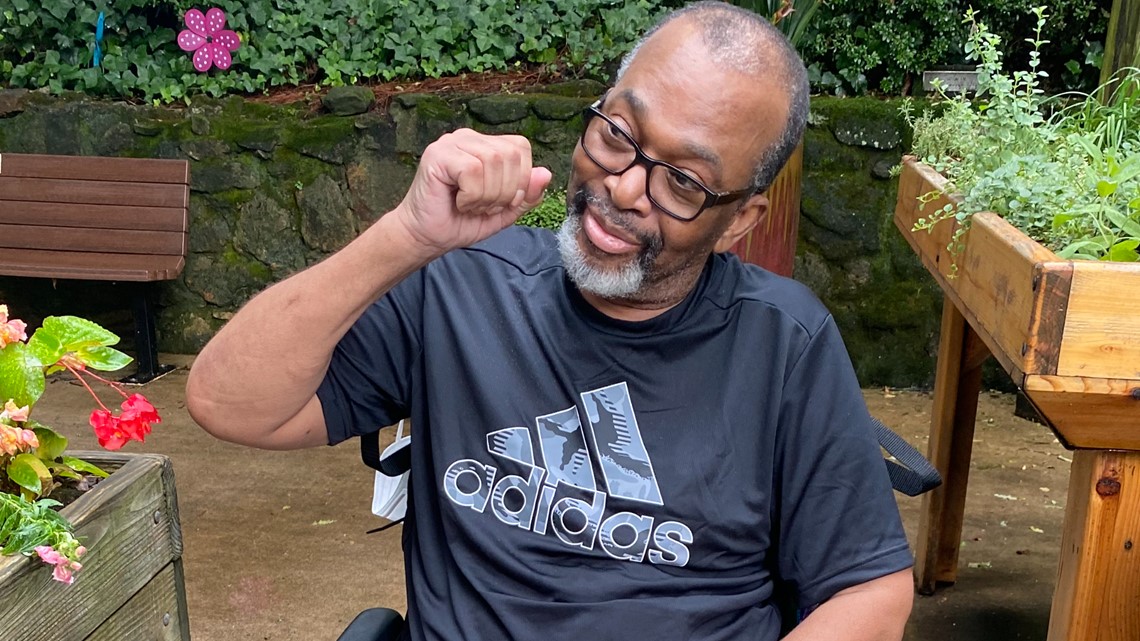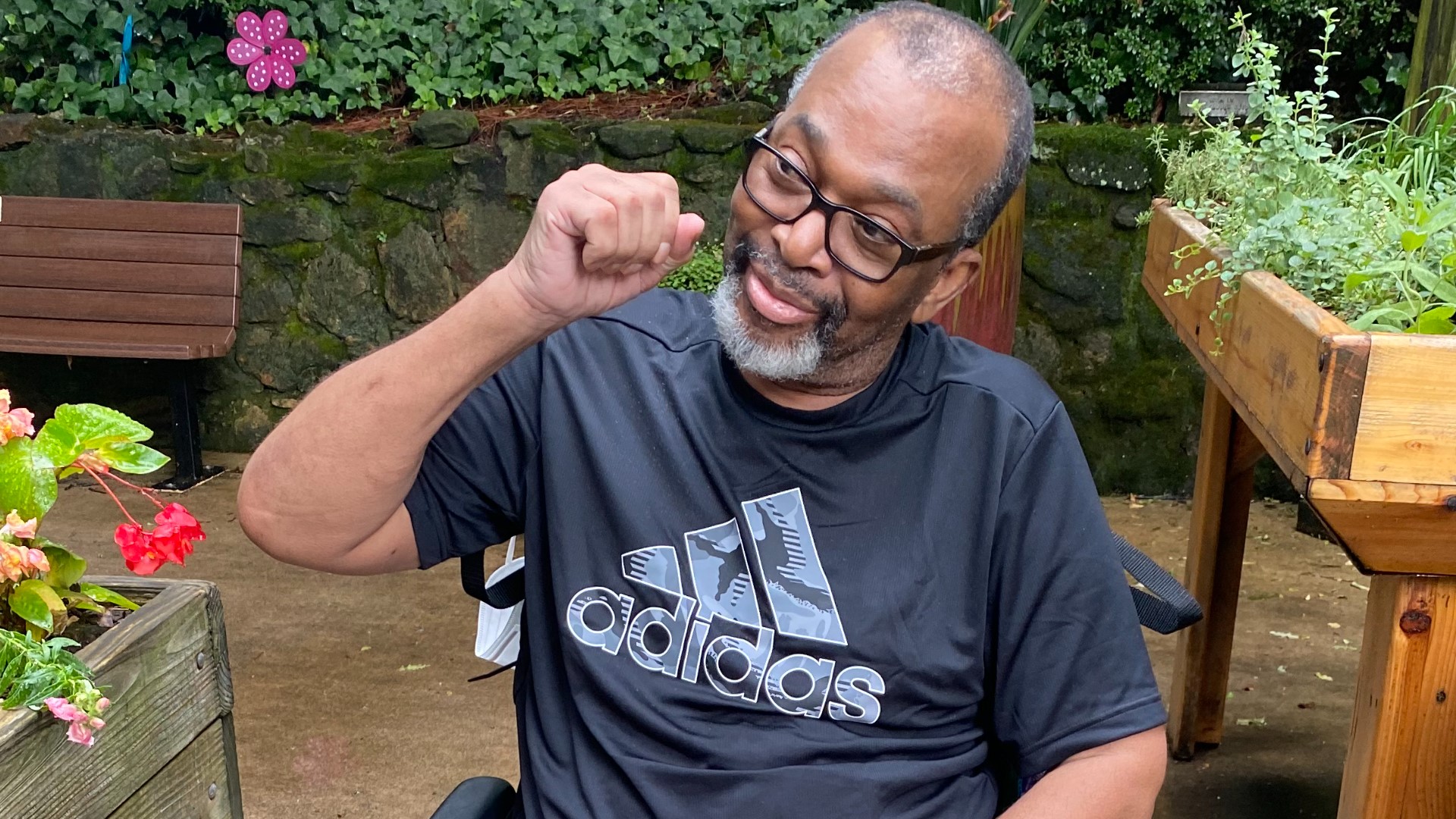LITHONIA, Ga. — An Army veteran and longtime MARTA employee had his life upended by COVID-19. Tony Rodney, 66, caught the virus at the beginning of the year and it's been a 10-month battle with the after-effects.
His daughter, Shereena, said one good thing has come from his fight.
"We spend a lot more time together," she said.
Time is something that almost ran out for the mother-father duo. Tony caught the virus and could barely talk when his daughter called him on Jan. 19.
"Every little word was like, a gasp. So, I said, 'I'm calling the ambulance.' And what did you say?" Shereena asked, looking at her dad.
"Hell no," Tony said with a light laugh.
"He was worried about medical bills," said Shereena.
But, the family did get Tony to the hospital where he spent months bed-ridden, on a ventilator. He needed rehab to deal with brain trauma from COVID-19, as well as muscle degeneration.
Shereena knew just the place. She's a case manager at the Shepherd Center. The facility is a world-renowned rehabilitation hospital and is used to treating brain and spinal cord injuries, along with other neuromuscular conditions.
Chief Medical Officer, Dr. Michael Yochelson, said it was natural to transition their training to help COVID patients.
"We saw patients who had strokes or some sort of non-traumatic spinal cord injury related to the COVID or neuropathies related to the COVID," Yochelson explained. "We would bring them in and do the rehab that we normally do for for our folks, and often it had to be tempered because of their medical condition, especially if they were still on a ventilator.”
For Tony, getting to Shepherd Center in March would be just what the doctor ordered.
"When he first got there, he couldn't even do this," said Shereena, wiggling her fingers in a grasping motion.
Tony would have to learn how to do simple things all over again: talk, walk, pick up objects.
"It was a long road for me to travel," said Tony.
Yochelson explained they took COVID-19 patients who recovered from the virus itself, but still had debilitating issues. Utilizing their in-house ICU, they could work with patients who were still on ventilators.
"A lot of it is related to their endurance, and you don't want to actually push them too hard. But at the same time, of course, you don't want to keep them in bed. Because if you're keeping in bed, they're going to get weaker and weaker," he explained.
Getting Tony to a place where he could start using a wheelchair, form full sentences, and eventually return home, was an "ultimate success" for Yochelson.
“The fact that we are able to get somebody who was very, very impaired and still on a ventilator and in the acute hospital, off of the ventilator and get him home is a testament to the team. And he's still still doing his rehab, still recovering. He's still in a wheelchair, but he's doing much better overall," said Yochelson.
Shereena said one of the blessings of Shepherd Center was their ability to train family members to continue therapies at home.
"You get them home and you're like, 'Oh, wait I don't know how to do this.' But, they train you there at the hospital and it set you up to help them when we get home."
Still, for Tony, the whole ordeal has been challenging. And for a Jamaican immigrant, who served in the U.S. Army for 23 years, slowing down is a just as painful of an experience.
He's worked for MARTA for 11 years, and choked with tears when he discussed how his physical restrictions lead him to make a difficult decision.
"I have to retire, I have to retire at a young age," Tony said tearfully. "I got a lot of support from Marta president and upper echelon and they really, you know, support me a lot. To have a job like that, and you can’t work, it makes you feel like you’re not worth anything. Not saying it’s the management or anything, it’s the system you know.”
Tony may not be able to work right now, but he’s laboring in other ways, navigating a new wheelchair ramp courtesy of the VA. And, he is learning the importance of those closet to him.
"When you're sick, that’s when you find out who your friends are, your family, when you’re sick," he said.
Shereena is grateful time still ticks for her dad.


"I’d rather have him here than not here and so, I think it’s a blessing and I’m thankful everyday for that.”
Tony said he’s trying to forget about the past and focus on his future. He’s always been one to work and said he’s ready to keep recovering and hopefully find out what his next chapter is.
As for the Shepherd Center, Yochelson said anyone can be referred to the Shepherd Center by a doctor or hospital for rehabilitation.
"Many people probably don’t put Shepherd Center and COVID in the same sentence, because they think about brain injury, they think about spinal cord injury, not about COVID rehabilitation," he said before adding the center is helping patients in Georgia and accepts patients from out of state as well.
To learn more about the Shepherd Center, visit their website.
Shereena continues to raise money to help with her father's ongoing medical bills and for caregivers.

